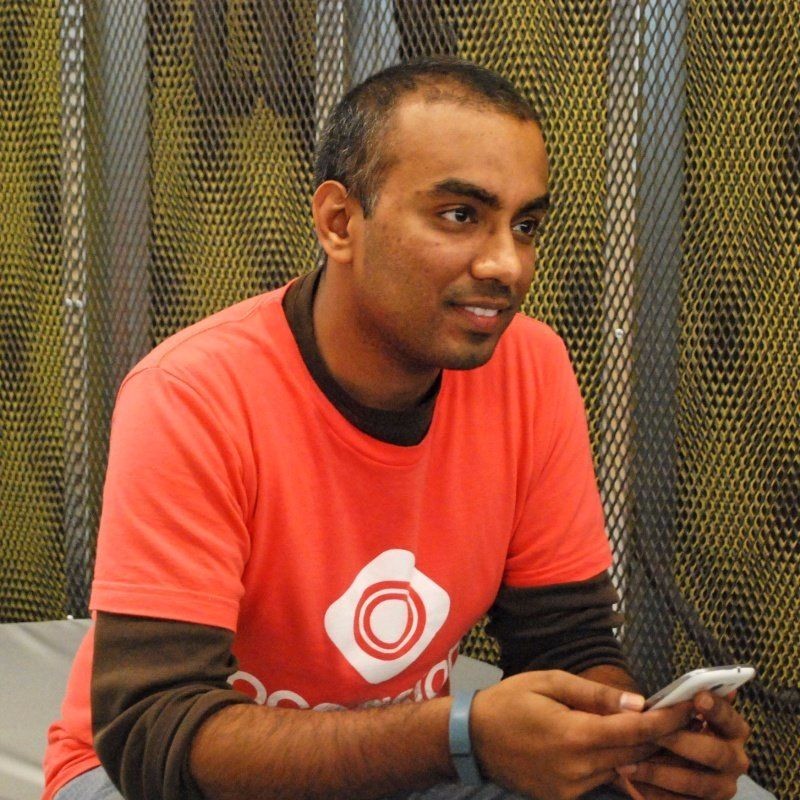
Aksh Gupta hunches over the latest sales report for his startup, Occasion, an online booking agency. Gupta seems oblivious to the constant clatter of computers, whispered conversations and occasional lunch meetings that permeate 1871, a shared working space in downtown Chicago. Like hundreds of entrepreneurs housed in this hotbed of tech business newbies, Gupta is trying to make his startup dreams reality. That story isn't new. What is interesting, though, is how he got on the road to start-up nation — a winding road that included a Master of Science in Economics & Policy Analysis from DePaul.
Economics — Not Just for Public Policy Wonks
It used to be that if you wanted to go into government, secure a think-tank job or become an expert on policy initiatives, the PhD in Economics was a surefire way to do it. There were no shortcuts. But Thomas Donley, chair of DePaul's Department of Economics, questioned whether this should be the only path and decided he wanted to do something a bit different.
"The PhD is the terminal degree in economics," Donley says. "Yet we knew that there were jobs waiting for students who had the right blend of a deep understanding of economic theory and the ability to apply that knowledge to real-world situations."
Working with Visiting Assistant Professor Robert Kallen and others, Donley went on a scouting trip. Kallen went to Washington, D.C., the Illinois State Capitol, and other centers of government to see if an MS in Economics could really land a student a job.
"After we talked to staffers, lobbyists and elected officials we found that if someone had a master’s level degree in economics they could undoubtedly find a job," Kallen says.
But four years after creating the graduate economics degree, DePaul discovered that Wall Street and Silicon Valley were also looking for employees who had sound economics backgrounds with real-world emphasis. And Gupta was looking for a program that would give him that background from a business school perspective instead of a liberal arts view.
"I was working at a real estate firm and I was looking to go to graduate school," Gupta says. "Economics was my area of interest, so I looked at various schools. I looked at Loyola, the University of Chicago, UIC (University of Illinois Chicago) and DePaul. Even though I got a full scholarship to go to UIC, my alma mater, I turned it down in favor of getting the MS in Economics from DePaul. I liked the business emphasis DePaul offered."
The Real World Needs Economists
Gupta doesn't see his master's degree in economics as unusual in the start-up world. In fact, he says, it makes him more marketable.
"Everything I learned in grad school — switching costs, enforcing value propositions, competitive dynamic play — it's the foundation of my business. DePaul has more of a business application to its master's degree in economics and that's what drew me.
In addition to offering a deeper understand of economics, including microeconomics, macroeconomics, statistics and other traditional aspects, DePaul's program also features a fellowship to apply theory to real-world problems.
Many students have worked on Capitol Hill, in lobbying firms and for policy think tanks through the degree's fellowship program. Now the fellowships have been extended to corporate entities as well. Companies hiring these students include KPMG, Walgreens, Allstate and Ernst & Young.
But why is a deeper understanding of economics so in demand? Well, mostly because it's rare.
"There are very few people who really understand economics," Kallen says. "If you have a background in economics, Washington and the marketplace need you. It's not just the theoretical aspects, you need some practical applications and that's what this degree teaches you."
Economics Is a Way of Thinking
At DePaul, a student can get the master's degree in economics in as little as 18 months. Another cost- and time-saving option is DePaul's 4+1 program that leads to earning a bachelor's and master's in economics in five years.
For Gupta, gaining a deeper knowledge of economics has been a boon to his fledging start-up because it allows him to make decisions when there are limited resources — the core of an economist's role.
"Economics is a way of thinking," Gupta says. "It is the junction of science and art and that is very crucial to technology."